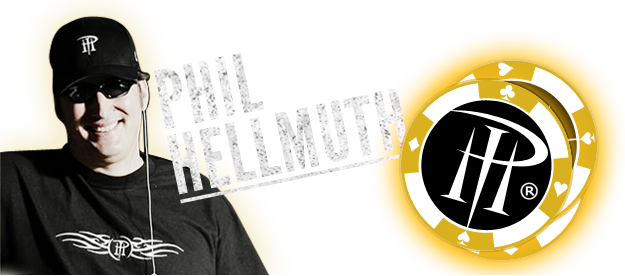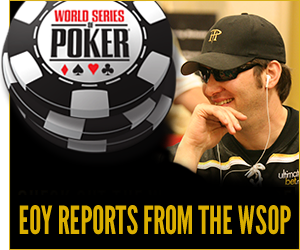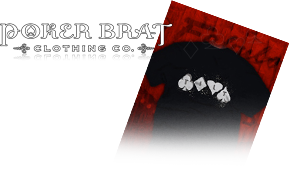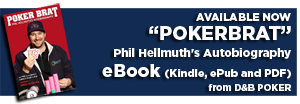-
At Bay 101, a Bad Play and a Bad Beat
The World Poker Tour came to the Bay Area in early March, and I was fired up! First, the hosting casino — the Bay 101 in San Jose, Calif. — resides in my backyard. And second, I had just final-tabled on the WPT in Los Angeles 10 days earlier, so I was feeling at the peak of my powers. I also had the added bonus of being able to sleep in my own bed. As I drove in to play in the tournament, I received a text message from John Juanda, saying he was betting a lot of money on me to win. I felt like Juanda had made a good bet, because when I begin to catch my stride in tourneys, I usually stay in “form” for a month or two. I knew that I was in form, partly because I had a clear blueprint — in my head — of how to win. The day-one part of that blueprint is this: Make it until the end of the day by playing patiently — and by avoiding big pots.
About an hour into the tournament, I was sitting on my starting chip stack of $20,000 when the following hand came up. With the blinds at $150 to $300, five players limped in, and I called $75 more from the small blind with 9s-6c. The flop was Qc-9c-2d. All five of us checked, and the turn card was the 4c. I bet out $1,100, three players folded and then Alex (a local player and a nice guy) made it $3,600 to go. I studied for a moment, and I thought that Alex probably had a weak hand that included the Ac, which would give him a draw at an ace-high flush. Why did I think Alex was weak? He had played five out of the last seven hands and hadn’t shown any of his hole cards. I assumed that he was loose and reckless.
So I called the $2,500 more. The river was the 9d, and now I checked. Alex bet $7,000, and I called him right away. Oops, Alex flipped up the Ac-10c (the nut flush!), and I had made a bad call. I had put $2,500 more into the pot with a second pair, without a winning card in the deck, and then hit a nine to pay off another $7,000 (yuck, I hate my play here). Was the nine on the river an unlucky card? Yes, but I should have seen the strength in Alex’s eyes, and folded my hand on fourth street for the $2,500 raise. I simply made a bad read, period. And it cost me half of my chips. If you’re going to risk that kind of money with a second pair, you better have a strong read that your opponent is weak.
As to the hand where I took a bad beat, with the blinds at $150 to $300, five people limped in, and I checked with 6-6 in the big blind. The flop was Ah-9h-6d, I checked, and surprisingly, everyone else checked.The turn card was the 5s, and we all checked to Player B (the guy on the button) who bet $1,200. I merely called. The player directly on my left, who stood in first position — Player L — made it $5,000 to go. Player B then called $3,800 more, and I called for tournament director Matt Savage to come over. In this “shooting star” tournament, if you took out a designated star, you won $5,000 in cash.
Along with that, whenever a star was all-in, the hands were flipped face up and announced. After a brief moment, I moved all-in for $5,600 more, and Player L folded his hand. Player B called with 10h-8h, and he had 10 wins: He needed one of seven hearts (he couldn’t hit the 5h or the 6h) to make a flush, or one of three sevens to complete a straight. So I had 34 wins to his 10 wins. The last card was the 4h, and I lost the pot.
What happened in this hand? I don’t mind the way anyone played it. I like the checks on the flop. Player B’s $1,200 bet on the turn was OK. My $1,200 call was designed to do two things: First, to lose less in case I had the worst hand; and second, to trap someone else into losing more money. The trap worked perfectly as Player L made a big bluff at the pot. When Player B called the $3,800, and didn’t reraise it, I knew that I had him beat. Now, all I had to worry about was whether Player L had me beat, and that didn’t seem likely. So I love my all-in move, and I do not have a problem with Player B’s $5,600 call. After all, there was a $5,000 cash bounty on my head, and it looked like he had at least 10 winning cards he could hit to win the pot. Mathematically, it cost him $5,600 to win roughly $22,400.
In other words, he was getting a four-to-one payout when he was at worst a 3.4-to-one underdog.
Related Posts
- Trust Your Instincts
- Sully’s Bad Beat – And His Cool Tattoo
- Shak Fires the Third Bullet
- Managing Fatigue Reduces Bad Reads, Sloppy Bets, and Losses
- Hello, Old Friend
- All Poker All the Time
- LA Story: And Then There Were Six
- Good Read, Bad Outcome
- Youth is Served — With a “False Tell”
- Another Late-Night Poker Gambit
Recent Posts
- WSOPE 2nd place finish
- Update from this years WSOP 2019
- Happy Holidays! Updated stock at Poker Brat, new book!
- Phil Hellmuth wins historic 15th World Championship!
- Final golden ticket winner coming soon
- Poker Brat – The Phil Hellmuth Jr. Autobiography
- Phil Hellmuth’s “Pokerbrat” – Coming soon to audio book!
- Poker Night in America – Sugar House Casino
- Sugar House w Matt Glantz
- Lost and found
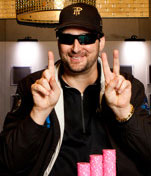
 ™
™



